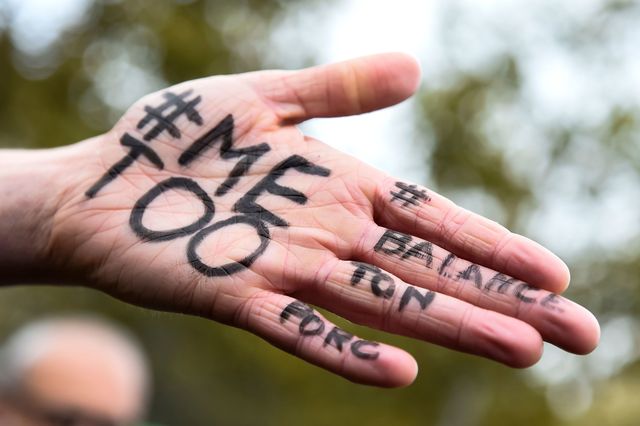'The psychological impact of reading through someone's really graphic thoughts about raping and murdering you is not necessarily acknowledged,' explains Laura Bates, founder of the Every Sexism Project. 'You could be sitting at home in your living room, outside of working hours, and suddenly someone is able to send you an incredibly graphic rape threat right into the palm of your hand.'
If you're a women who Tweets a lot, you'll be more than familiar with the above situation. If you're a Black, Asian or Minority Ethnic woman (BAME), LGBTI, or non-binary individual, it's undoubtedly worse. In 2018, being called a 'c*nt' and told you deserved to be raped has somehow become the norm for social media users.
So why isn't Twitter doing anything about it? We know it's a huge problem, yet still the abuse and violence directed solely at women persists.
A new report, #ToxicTwitter, published today has highlighted just how bad the situation is. Amnesty surveyed more than 1,100 women, including politicians, journalists, and regular users across the UK and US, over a two-day period.
In their testimonies, women talked about the nature of abuse they received, which included - somewhat unsurprisingly - death and rape threats, in addition to racist, transphobic and homophobic abuse.
'Most of the harassment I receive is on Twitter,' Erin Matson, an American writer and activist, told Amnesty. 'It's very fast paced and people send you horrible images. One time I tweeted that white people need to be accountable towards racism and I started getting images of death camps…. I've reported people to Twitter but I never heard back'.
And it's not just public figures, either. While you'd expect journalists and MPs to be targets because they regularly stick their heads above the parapet, day-to-day users also experience worrying levels of abuse, especially if they Tweet about issues like sexism.
The results reveal women have a severe lack of trust in Twitter's ability to deal with the issue: only 9% of British women think the platform is doing enough to help women.
Twitter does have a reporting system in place, whereby users can flag accounts or Tweets that are in violation of its 'Hateful conduct policy'. Yet many women that Amnesty spoke to explained that they'd reported Tweets to little or no effect.
Seyi Akiwowo, a UK politician and activist, reported approximately 75 comments on both YouTube and Twitter and did not receive 'feedback or acknowledgment'.
'It took around two hours to go through the comments and it was really upsetting,' she explains. 'Twitter never actually contacted me when I reported it – they only started suspending those accounts and deleting those tweets after I appeared on the ITV's London Tonight and did media interviews with BuzzFeed and BBC.'
Another UK journalist, Allison Morris, explained that after reporting over 100 abusive posts to Twitter, they removed just two: 'one was a threat and the other had a pornographic image.'
As Kate Allen, the Director of Amnesty International UK, explains: 'The trolls are currently winning, because despite repeated promises, Twitter is failing to do enough to stop them.'
'Twitter must take concrete steps to address and prevent violence and abuse against women on its platform, otherwise its claim to be on women's side is meaningless.'
And, according to politician Dianne Abbott, it's effecting the way we use social media.
'[Online abuse] is not free speech, it's actually limiting everyone else's free speech,' she explains. 'In my experience there are many women, and many women of colour, who don't participate online in the way that they would want to, because they're really repelled by the level of abuse you get.'
Results from the #ToxicTwitter report back this up: some 78% of British women don't think Twitter is a place where they can share their opinion without receiving violence or abuse.
Which is, sadly, something Abbott is all-too familiar with. In the run-up to the 2017 General Election, she received almost half of all the abusive tweets sent to female MPs. The abuse directed at her amounted to 10 times as much as was received by any other MP, according to (another) Amnesty study.
Twitter released a statement disagreeing with the findings, saying it 'cannot delete hatred and prejudice from society.' The company repeatedly refused to share data on how it addresses reports of abuse, but did say they'd made more than 30 changes in the past 16 months to improve safety, including increasing the instances of action it takes on abusive tweets.
Amnesty have given clear guidance on how Twitter can become a safer place for women, which includes improving reporting mechanisms, providing clarity about how the platform interprets and identifies violence and being more proactive about educating users.
Amnesty have also asked for more transparency from Twitter, suggesting they share information about the nature and levels of abuse against women.
When abusers are targeting every kind woman - from those with disabilities to women from ethnic or religious minorities - we risk driving already marginalised voices out of public conversations.
And then where we will be?














